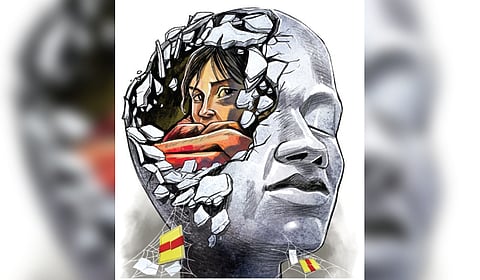

NEW DELHI: All states and Union Territories will have to mandatorily appoint for child sexual abuse victims a ‘support person’ or a professional who will provide them emotional, psychological, and legal assistance during their challenging and traumatic period so that they can be protected and rehabilitated.
These trained support persons will protect the victims from external pressure; provide a witness protection scheme, if necessary; accompany them during statement recording, investigation, medical examination and trial; and help them access facilities like education and public distribution system.
The support person will also facilitate the child with medical assistance and treatment, besides counselling to come out of the trauma, and inform the victim about the availability of legal aid assistance.
These are some of the model guidelines framed by the National Commission for the Protection of Child Rights (NCPCR) for the regulation of ‘support person’ in case of child sexual abuse victims, which has been shared with the states and union territories.
The child rights body framed the guidelines following an October 9, 2023 order of the Supreme Court, which directed it to develop these guidelines under Section 39 of Prevention of Children Against Sexual Offences Act, 2012 (POCSO Act) in consultation with states.
On July 30, the apex court asked the states to implement the SOP formulated by NCPCR within four weeks.
Complying with the SC directions, the NCPCR chairperson, Priyank Kanoongo, on August 8, wrote to all the state chief secretaries asking them to issue directions for the implementation of these guidelines.
He also asked the states to share the office order regarding the implementation of the guidelines in all their districts, a copy of the ad for the empanelment of support persons and a copy of the order regarding directions to upload details of support persons in NCPCR’s ‘POCSO Tracking Portal.’
Kanoongo, who attached the over 30-page guidelines with the letter, also told the states that they should issue directions for engaging organisations/NGOs to further empanelment of support persons as per requirements and establish eligibility criteria at the state level. He asked them to furnish the information by August 16.
He said the states must provide support persons to POCSO victims, which cannot be made optional unless there are good reasons recorded by the Child Welfare Committee (CWC) in its order or requested by the child or the victims’ parents in a written statement.
The guidelines state that for a child without parental/familial support, the support person can play a significant role by providing assistance and access to protection, rehabilitation, reintegration, healing and justice by informing and getting recommendations from CWC and concerned authorities
“While dealing with the incest cases, the support person shall assist the child and the family in finding alternate residences and will make efforts to connect a child with people who can provide support and facilitate relocation,” the guidelines said.
“In cases where the child is pregnant, the support person shall connect the child with the hospitals to address the child's healthcare needs. In cases where the child has contacted or is infected by Sexually Transmitted Infections or has become HIV positive, then the support persons can connect the child to services and organisations with necessary expertise,” it added.
“In case of financial difficulty, support persons may connect the child and his/her family with philanthropic organisations or individuals willing to sponsor the child or refer to the government scheme in their region to fund their education, etc., while maintaining utmost confidentiality”, it added.
The guidelines also stated that if the child is not keen or is reluctant to resume school, the support person shall connect the child with a vocational training/skill development centre that helps develop a skill that enables the child’s financial independence.
The guidelines put in place a critical framework for the qualification, duration of engagement of a support person, appropriate remuneration, how many cases he or she should handle at one time, rules for termination, etc.